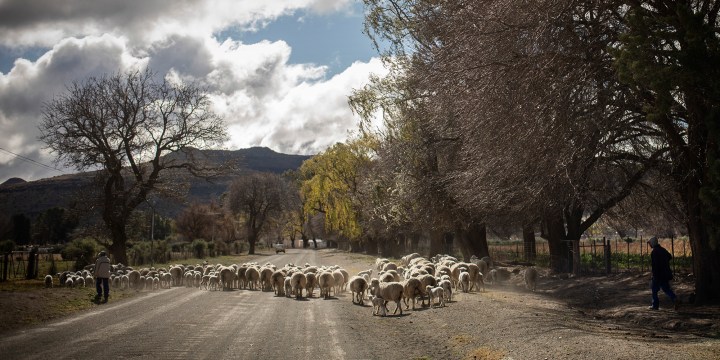OP-ED
Blow for farmers: SA court bans the export of live sheep

The fortunes of sheep farmers whose livestock was destined for the Middle East hangs in the balance. The industry has lost the latest round of its legal battle with the NSPCA over the export of livestock by sea.
On a cold and windy Eastern Cape day at the start of June, a shipment of some 70,000 sheep was intercepted and interdicted on an interim basis from setting sail to the Middle East.
In another twist in this ongoing saga between the National Council of SPCAs (NSPCA) and the industry, this week the animal welfare organisation successfully fended off an urgent court challenge to its interim interdict filed by industry players.
The NSPCA is vehemently opposed to the transport of live animals by sea, especially during this time of the year, citing adverse weather conditions that heighten the probability of animal mortality. The organisation is also none too pleased about how the animals are packed on ships.
The urgent application challenging the interim interdict was heard on 25 June by the High Court in Grahamstown. The NSPCA came out on top on Tuesday 30 June. Between now and 16 July, when a hearing is set down for an outright ban on the export of live animals by sea, the sheep will remain on South African shores.
Al Mawashi, the eponymous subsidiary of the Kuwaiti-listed meat handler and exporter, spearheaded the unsuccessful court challenge. Earlier in 2020, Al Mawashi, which has a head office in Beacon Bay, East London, signed a three-year, preferential procurement agreement worth nearly R100-million with emerging black livestock farmers.
Now, however, farmers, both emerging and established, are faced with the prospect of billions lost because of unrealised revenue. This constitutes bad news for an industry confronting challenges on multiple fronts, says Christo van der Rheede, the AgriSA deputy executive director.
“Those sheep must come back into the South African market. You’re going to have a surplus of meat,” laments Van der Rheede.
At present, South Africa has an agreement with the Middle East to export a large quantity of sheep to the region.
One would seldom find commercially orientated farmers deliberately acting against their own self-interest by allowing their animals to be kept in suboptimal conditions.
When the NSPCA initially went to court to interdict the shipment of the sheep, the organisation accused the industry of not complying with specific animal welfare regulations.
As matters stand, 25% of the 70,000 livestock stuck at Al Mawashi’s feedlot belong to black emerging farmers, while the ship meant to transport the animals is docked in limbo at the East London Harbour. Costs are accruing for all sides.
These farmers, as well as their peers, rear the animals under difficult and prevailing drought conditions in the northern Western Cape, Northern Cape and parts of Eastern Cape – in the area referred to as the Karoo, where the provinces intersect.
Given the uncertainty around the impending shipment, there is a high likelihood the sheep will make their way to a supermarket shelf near you. Should that be the case, Van der Rheede says farmers anticipate a massive decline in local prices, which will affect sheep farmers’ profits.
“For us, it is a bit of a setback. At the end of the day, you must keep the South African economy going. We must be able to export to the rest of the world. It is only through exports that you earn a lot of money not only for farming; you also earn a lot of foreign exchange for the country,” according to Van der Rheede.
Furthermore, given the dire economic situation in the country, Van der Rheede says the industry is disappointed that “people go to court with all kinds of frivolous matters”.
The consequences will not only be limited to the industry, but will extend to the wider economy.
One would seldom find commercially orientated farmers deliberately acting against their own self-interest by allowing their animals to be kept in suboptimal conditions.
“Who would be so silly to send live sheep from South Africa and the animals are dead on arrival at the destination?” asked Van der Rheede rhetorically. It seems counter-intuitive, factoring the amounts of money involved across the board.
There is a general feeling in the industry that a sober conversation must take place about this issue. The industry is adamant it would not engage in conduct that poses the risk of economic harm to itself by not adhering to guidelines and regulations.
For now, though, “it is a ping-pong game in [court]”.
Meanwhile, the industry suffers and the farmers suffer – but at least the sheep are sort of safe, for now, until the next court bout makes a determination. BM/DM

















 Become an Insider
Become an Insider